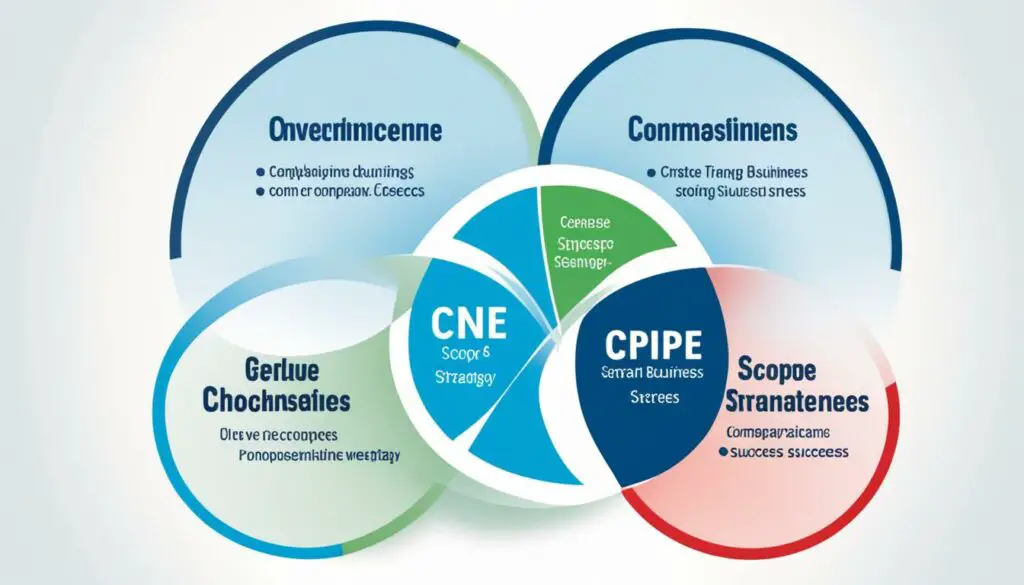Understanding the difference between business strategy and marketing strategy is crucial for achieving business goals and driving growth. While both strategies aim to contribute to overall organizational success, they serve different purposes and require distinct approaches.
Business strategy refers to the long-term plan of action that helps a company achieve its objectives and gain a sustainable competitive advantage. It involves strategic planning, business development, and the assessment of internal and external factors through methods such as competitive analysis, market research, and SWOT analysis. Business strategy encompasses all aspects of a business and serves as a roadmap for strategic implementation.
On the other hand, marketing strategy is a component of the broader business strategy. It focuses on promoting products or services to target audiences effectively. Marketing tactics, such as positioning, messaging, pricing, and distribution, are developed based on market research and customer insights. Marketing strategy ensures that the value proposition reaches the right audience through appropriate communication channels.
While business strategy provides the overall direction and goals for an organization, marketing strategy defines the specific tactics to accomplish those goals. Both strategies work hand in hand to create a cohesive and successful business plan.
Key Takeaways:
- Business strategy is a long-term plan that guides an organization towards achieving its goals and gaining a competitive advantage.
- Marketing strategy is a component of the broader business strategy that focuses on promoting products or services to target audiences.
- Business strategy involves strategic planning, business development, and the assessment of internal and external factors, while marketing strategy focuses on tactics such as positioning, messaging, and distribution.
- Both business strategy and marketing strategy are essential for driving organizational success and should be developed, implemented, and evaluated together.
- Understanding the differences and relationship between business strategy and marketing strategy is crucial for effective goal achievement and business growth.
What is Business Strategy?
Business strategy is a long-term plan that outlines the goals, objectives, and tactics to achieve them. It serves as a roadmap for the organization, guiding decision-making and resource allocation. The objective of a business strategy is to create a sustainable competitive advantage that sets the organization apart from its competitors.
When developing a business strategy, several factors are taken into consideration. Market trends and customer needs are analyzed to identify opportunities and potential areas of growth. By leveraging the strengths of the organization and addressing its weaknesses, the strategy aims to position the company for success.
A clear business strategy helps align the efforts of individuals within the organization towards common goals and objectives. It provides a framework for decision-making, ensuring that all actions are in line with the long-term vision of the company.
Benefits of a Business Strategy
A well-defined business strategy brings numerous benefits to an organization. It enables effective resource allocation, ensuring that investments are aligned with the long-term goals and objectives. By establishing a clear direction, it helps in fostering innovation and adaptability, enabling the organization to respond to changes in the market.
Furthermore, a business strategy enhances communication and collaboration within the organization. It provides a shared understanding of the company’s mission and priorities, facilitating cohesive teamwork towards common objectives.
Ultimately, a robust business strategy enhances the organization’s overall performance and enables sustainable growth in a competitive market.
| Business Strategy | Marketing Strategy |
|---|---|
| Long-term plan | Short-term plan |
| Focuses on overall goals and objectives | Focuses on marketing-specific activities |
| Measured by overall business performance metrics | Measured by marketing-specific metrics |
| Considers market trends, customer needs, and strengths/weaknesses | Considers target audience, value proposition, and messaging |
What is Marketing Strategy?
Marketing strategy is a crucial component of the overall business strategy. It focuses specifically on the marketing activities that promote products or services. By planning and implementing an effective marketing strategy, businesses can reach their target audience, communicate their value proposition, and achieve their marketing objectives.
The key elements of a marketing strategy include:
- Target audience: Identifying the specific group of consumers or businesses that the marketing efforts will focus on.
- Value proposition: Defining the unique value that the products or services offer to the target audience.
- Marketing mix: Selecting and coordinating various marketing tactics, such as advertising, sales promotions, and public relations, to reach the target audience effectively.
- Messaging and communication channels: Developing persuasive messaging and identifying the communication channels, such as social media, email marketing, and content marketing, to deliver the message to the target audience.
A well-developed marketing strategy aligns with the overall business objectives and ensures that the marketing efforts are targeted and effective. It helps businesses attract and retain customers, differentiate themselves from competitors, and ultimately drive sales and business growth.
Differences between Business Strategy and Marketing Strategy
While both business strategy and marketing strategy play crucial roles in achieving organizational success, they differ in terms of scope, timeframe, focus, metrics, and integration. Understanding these differences is essential for optimizing the effectiveness of both strategies.
Scope
Business strategy has a broader scope as it encompasses all aspects of the business, including operations, finance, human resources, and more. On the other hand, marketing strategy has a narrower focus, solely concentrating on marketing activities such as product promotion, pricing, distribution, and advertising.
Timeframe
Business strategy is a long-term plan that outlines the organization’s goals and objectives, typically spanning several years. In contrast, marketing strategy is a short-term plan that focuses on achieving specific marketing objectives within a shorter timeframe, often aligning with business strategy milestones.
Focus
Business strategy places its emphasis on overall goals and objectives that align with the organization’s mission and vision. It sets the direction for the entire business, including the allocation of resources and identification of growth opportunities. Marketing strategy, on the other hand, is more granular and focuses on marketing-specific activities aimed at reaching the target audience, creating brand awareness, and driving sales.
Metrics
Business strategy is measured by comprehensive business performance metrics such as revenue, profitability, market share, customer satisfaction, and return on investment. In contrast, marketing strategy is measured by marketing-specific metrics such as customer acquisition, conversion rates, click-through rates, brand recognition, and market penetration.
Integration
Business strategy is integrated into all aspects of the organization, ensuring that marketing activities align with the overall strategic direction. Marketing strategy, while integrated into the overall business strategy, primarily focuses on integrating marketing activities to support the achievement of business goals. This integration ensures consistency and coherence across all functional areas of the organization.
By understanding and leveraging these differences, businesses can develop comprehensive strategies that encompass both the broader vision of the organization and the specific marketing actions necessary to drive success.
The Relationship between Business Strategy and Marketing Strategy
The relationship between business strategy and marketing strategy is one of alignment and integration. Business strategy serves as the foundation upon which marketing strategy is built and executed. By aligning these two strategies, businesses can ensure consistency and coherence in their approach. This alignment enables marketing tactics to support the overall business goals and objectives, leading to a more effective and impactful execution.
Integration is key to the successful implementation of both business strategy and marketing strategy. When these strategies are integrated, they can work together seamlessly, leveraging each other’s strengths and resources. The integration allows for a more holistic approach, where marketing efforts and initiatives are closely tied to the larger business goals, resulting in a more cohesive and impactful overall strategy.
Consistency is essential in maintaining a unified brand and message. When business strategy and marketing strategy are consistent, they create a harmonious customer experience across all touchpoints. This consistency builds trust and brand loyalty, reinforcing the business’s positioning in the market.
Flexibility and adaptability are also crucial in the relationship between business strategy and marketing strategy. In today’s fast-paced and ever-changing business landscape, the ability to adapt quickly to new market trends and consumer demands is essential. By aligning marketing strategy with the broader business strategy, organizations can be more agile and responsive to market changes, ensuring their tactics remain relevant and effective.
This relationship between business strategy and marketing strategy can be summarized as follows:
| Business Strategy | Marketing Strategy |
|---|---|
| Serves as the foundation | Executes the business strategy |
| Provides the long-term plan | Focuses on short-term tactics |
| Drives overall goals and objectives | Supports marketing-specific activities |
| Measured by business performance metrics | Measured by marketing-specific metrics |
| Integrated into all aspects of the business | Integrated into the overall business strategy with a marketing focus |
The Roles of Business Strategy and Marketing Strategy
Effective business strategy and marketing strategy play pivotal roles in the success and growth of an organization. Let’s explore the key responsibilities and skills required for each.
Business Strategy
The top management or board of directors typically spearheads business strategy development. This critical role demands strategic thinking, leadership, and exceptional decision-making skills. Top-level executives collaborate to define the long-term objectives, set the overall direction, and ensure sustainable growth for the organization.
Marketing Strategy
The marketing department, led by the Chief Marketing Officer (CMO), takes charge of crafting the marketing strategy. Analytical skills are crucial for monitoring market trends, conducting competitor analysis, and identifying target audiences. Creative skills are required for positioning the brand and designing compelling marketing campaigns. Effective communication skills help to convey the brand message and engage customers across various channels.
Collaboration between business strategy and marketing strategy is essential for streamlined operations and efficient goal achievement. Business strategy provides the foundation and direction for marketing initiatives, while marketing strategy contributes to the overall execution of the business strategy. Collaboration with other departments and stakeholders further strengthens the organization’s position in the market.
| Top Management | Board of Directors | Marketing Department | Chief Marketing Officer |
|---|---|---|---|
| Strategic thinking | Decision-making skills | Analytical skills | Creative skills |
| Leadership | Communication skills |
The Benefits of Distinguishing Business Strategy and Marketing Strategy
When it comes to strategic planning, it is crucial to distinguish between business strategy and marketing strategy. By avoiding confusion, duplication, and contradiction, businesses can enhance their competitive advantage, improve customer satisfaction, and boost overall business performance.
One of the key benefits of distinguishing business strategy from marketing strategy is the ability to create synergy. By aligning and integrating these two strategies, businesses can harness the power of innovation and learning, leading to more effective goal achievement.
By clearly defining and differentiating business strategy and marketing strategy, businesses can ensure that each strategy plays its unique role in driving success. This clarity allows for better decision-making, resource allocation, and strategic implementation.
Benefits of Distinguishing Business Strategy and Marketing Strategy:
- Enhances competitive advantage
- Improves customer satisfaction
- Boosts business performance
- Creates synergy
- Fosters innovation and learning
- Facilitates effective goal achievement
| Business Strategy | Marketing Strategy |
|---|---|
| Long-term plan of action | Focuses on promoting products or services |
| Measures overall business performance | Measures marketing-specific metrics |
| Integrated into all aspects of the business | Integrated into overall business strategy with a focus on marketing |
What is a Business Strategy?
A business strategy encompasses the vision and mission of the company, the company structure, an action plan with measurable outcomes, accountability, and key performance indicators. It serves as a big-picture, long-term plan that guides the direction and growth of the company.
At the core of a business strategy is the vision and mission, which define the purpose and aspirations of the company. These provide a clear direction and serve as a compass for decision-making and goal-setting.
The company structure is another crucial element of a business strategy. It outlines the organizational hierarchy, departments, and reporting lines, ensuring efficient coordination and effective decision-making within the company.
An action plan is developed to achieve the goals set by the business strategy. It includes strategic objectives, specific initiatives, and a timeline for implementation. Measurable outcomes are defined to track progress and evaluate the success of the strategy.
Accountability is an essential aspect of a business strategy. It ensures that individuals and teams are responsible for specific tasks and deliverables. Regular monitoring and reporting on progress foster a culture of ownership and results-driven performance.
Key performance indicators (KPIs) are used to measure the effectiveness of the business strategy. These metrics provide quantifiable benchmarks to assess performance, identify areas for improvement, and make informed strategic decisions.
Overall, a robust business strategy sets the foundation for sustainable growth and success. It aligns the company’s actions with its vision and mission, establishes clear goals and objectives, and provides a roadmap for achieving them.
What is a Marketing Strategy?
A marketing strategy plays a crucial role in achieving the goals of a company. It focuses on various aspects that contribute to the company’s success in the market. Let’s explore the key elements of a marketing strategy:
1. Target Market
A marketing strategy begins by identifying the target market, which is the specific group of customers that the company aims to reach. This involves analyzing demographics, psychographics, and consumer behavior to understand the target audience better.
2. Positioning
Positioning refers to how the company wants to be perceived in the minds of consumers. It involves creating a unique value proposition that differentiates the company’s products or services from competitors. Effective positioning helps build a strong brand image and attracts the target market.
3. Messaging
Messaging plays a crucial role in communicating the value proposition to the target market. The marketing strategy defines the key messages that need to be conveyed through various channels such as advertising, content marketing, and social media. Clear and compelling messaging helps create brand awareness and drive customer engagement.
4. Future Plans
A marketing strategy considers the company’s future plans and goals. It outlines the strategies and tactics that will be implemented to achieve long-term growth and success. This may include plans for product expansion, market penetration, or diversification into new markets.
5. Adapting to Change
A successful marketing strategy is adaptable to the ever-changing market dynamics. It takes into account shifts in consumer preferences, emerging trends, and technological advancements. By staying agile and responsive to change, a company can maintain its competitive edge and seize new opportunities.
Overall, a well-defined marketing strategy aligns with the company’s overall business strategy and supports the achievement of its goals. It provides a roadmap for targeting the right audience, positioning the company effectively, delivering compelling messaging, and adapting to a dynamic market environment.
By integrating these elements into the marketing strategy, companies can enhance their brand presence, engage their target market effectively, and achieve sustainable growth.
The Difference between Business Strategy and Marketing Strategy
When it comes to strategizing for your business, there are two key aspects to consider: the overall business strategy and the marketing strategy. While they may seem similar, there are distinct differences between the two that affect the way you approach your goals and objectives.
Level of abstraction: Business strategy is more abstract and focuses on the big picture, long-term vision for your company. It involves setting broad goals and objectives that steer the direction of the entire organization. On the other hand, marketing strategy deals with the specific details and tactics aimed at promoting your products or services.
Scope: Business strategy has a wider scope as it encompasses all aspects of your business, from operations to finance to HR. It takes into account the entire business ecosystem and how each function contributes to the overall success. Marketing strategy, on the other hand, has a narrower scope and is solely dedicated to the promotion and positioning of your offerings in the market.
Long-term vs Short-term: Business strategy is focused on long-term planning and setting a roadmap for sustainable growth. It involves anticipating market trends, understanding customer needs, and leveraging your strengths and weaknesses to gain a competitive advantage. In contrast, marketing strategy is more short-term oriented, considering the immediate goals and objectives that can be achieved through specific marketing tactics and campaigns.
Big picture vs Details: Business strategy is concerned with the big picture, taking into consideration the overall industry landscape and the positioning of your company within it. It involves analyzing market trends, conducting competitive analysis, and identifying opportunities for growth. Marketing strategy, however, is more focused on the details of execution, such as crafting compelling messaging, selecting the right communication channels, and implementing marketing campaigns.

| Aspect | Business Strategy | Marketing Strategy |
|---|---|---|
| Level of abstraction | High | Low |
| Scope | Wide | Narrow |
| Timeframe | Long-term | Short-term |
| Focus | Big picture | Details |
Conclusion
Understanding the difference between business strategy and marketing strategy is crucial for achieving business success. Business strategy sets the overall direction and goals for an organization, while marketing strategy defines the specific tactics to achieve those goals. Both strategies are interconnected and should be developed, implemented, and evaluated together to maximize results.
Business strategy encompasses the long-term plan of action, focusing on gaining a sustainable competitive advantage through market trends, customer needs, and organizational strengths and weaknesses. On the other hand, marketing strategy is a component of the business strategy that concentrates on promoting products or services through target audience identification, value proposition creation, and the selection of appropriate marketing mix elements.
By distinguishing between business strategy and marketing strategy, businesses can avoid confusion, duplication, and contradiction. A clear distinction enhances competitive advantage, customer satisfaction, and overall business performance. Integrating these strategies creates synergy, fosters innovation, and promotes continuous learning. Ultimately, aligning and integrating business strategy and marketing strategy lead to the effective and efficient achievement of business goals.
FAQ
What is the difference between business strategy and marketing strategy?
Business strategy refers to the long-term plan of action to achieve objectives and gain a competitive advantage, while marketing strategy focuses specifically on promoting products or services.
How is business strategy measured?
Business strategy is measured by overall business performance metrics.
How is marketing strategy measured?
Marketing strategy is measured by marketing-specific metrics.
What does a business strategy include?
A business strategy includes the vision and mission of the company, company structure, action plan with measurable outcomes, accountability, and key performance indicators.
What does a marketing strategy focus on?
A marketing strategy focuses on the target market, positioning the company in that market, defining messaging, and adapting to future changes.
How do business strategy and marketing strategy relate to each other?
Business strategy provides the foundation for marketing strategy, while marketing strategy contributes to the execution of business strategy. They should be developed, implemented, and evaluated together.
Who leads the development of business strategy?
Business strategy is usually led by top management or the board of directors.
Who leads the development of marketing strategy?
Marketing strategy is typically led by the marketing department or the chief marketing officer.
What are the benefits of distinguishing business strategy and marketing strategy?
Distinguishing these strategies helps avoid confusion, duplication, and contradiction. It enhances competitive advantage, customer satisfaction, and overall business performance.
What is the main difference between business strategy and marketing strategy?
The main difference lies in the level of abstraction and scope. Business strategy is more general and focused on the long-term big picture, while marketing strategy is more specific and focuses on short-term details.
Why is it important to understand the difference between business strategy and marketing strategy?
Understanding the difference is crucial for business success. Business strategy sets the overall direction and goals, while marketing strategy defines the specific tactics to achieve those goals. Both strategies should be developed, implemented, and evaluated together for optimal results.




